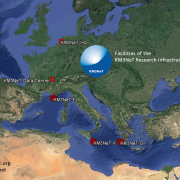
(pdf version) (pictures taken during the launch event)
10 March 2016: Today, at its launch event at the Royal Netherlands Academy of Arts and Sciences in Amsterdam, the European Strategy Forum for Research Infrastructures (ESFRI) announced that KM3NeT 2.0 is selected for the 2016 ESFRI Roadmap. KM3NeT is a distributed research infrastructure with deep-sea sites planned in the Mediterranean Sea near Toulon (France), Sicily (Italy) and Pylos (Greece). The scientific goals of the KM3NeT Collaboration are the discovery of astrophysical sources of cosmic neutrinos, the determination of the neutrino mass ordering and synergetic research opportunities for marine and environmental studies.
The ESFRI Roadmap identifies new Research Infrastructures of pan-European interest corresponding to the long-term needs of the European research communities. Its mission is to ensure that scientists in Europe have access to world-class facilities for cutting-edge research.
To be eligible for the roadmap a research infrastructure should have at least three countries with funding commitment and political support.
Dr. S. Harissopulos, director of the Institute of Nuclear and Particle Physics of NCSR “Demokritos”: “The Greek Minister of Research encouraged us to actively participate in KM3NeT 2.0.”
After a rigorous selection process in which projects were assessed for scientific excellence, pan-European relevance, socio-economic impact, e-needs and maturity level, KM3NeT 2.0 is amongst the 21 chosen projects.
“Full steam ahead for KM3NeT 2.0. The ESFRI review was maybe not easy, but certainly beneficial.” said Prof. Dr. Maarten de Jong, spokesperson of the KM3NeT Collaboration, during his talk at the launch event, in which he explained the scientific goals of the research infrastructure and highlighted the recent progress.
Prof. Dr. Michel Spiro, chairperson of the KM3NeT Scientific and Technical Advisory Committee confirms: “This is a new step towards neutrino astronomy and further deciphering the Universe and neutrino mysteries.”
Prof. Dr. Antonio Masiero, the chairperson of the KM3NeT Resources Review Board, chairperson of the APPEC Scientific Advisory Committee and vice-president of INFN notes, “This is excellent news, KM3NeT continues to be considered by EU as an important project and an innovative research infrastructure at the continental level. This vote of confidence will be instrumental as KM3NeT rapidly moves forward on the realisation of the envisaged research facility.”
===Note for editors===
Submitted by the KM3NeT Collaboration, 10 March 2016
Contact:
Prof. Dr. Maarten de Jong, km3net-spokesperson@km3net.de, tel. +31-20-592-2121
Prof. Dr. Antonio Masiero Antonio.Masiero@pd.infn.it
Prof. Dr. Michel Spiro spiro@hep.saclay.cea.fr
Dr. Sotirios Harissopoulos sharisop@inp.demokritos.gr
Partner institutes in the KM3NeT Collaboration, including observers :
Cyprus: University of Cyprus, Department of Physics, France: Centre de Physique des Particules de Marseille (CPPM), AstroParticule et Cosmologie (APC, Paris), Institute Pluridisciplinaire Hubert Curien (IPHC, Strasbourg), Germany: Erlangen Centre for Astroparticle Physics (ECAP) and Dr. Remeis Observatory Bamberg (both University of Erlangen-Nürnberg), Kepler Centre for Astro and Particle Physics (University of Tübingen), University of Würzburg, Greece: National Centre for Scientific Research “Demokritos” (NCSR-D, Athens), National and Kapodistrian University of Athens, Hellenic Open University (Patras), Aristotle University of Thessaloniki, Technological Education Institute of Piraeus, Italy: Istituto Nazionale di Fisica Nucleare, Laboratori Nazionali del Sud (INFN/LNS, Catania), INFN and Università di Bari, INFN and Università di Bologna, INFN and Università di Catania, INFN and Università di Genova, INFN and Università Federico II di Napoli and Seconda Università di Napoli, INFN and Università di Pisa, INFN and Università di Roma “Sapienza”, Università di Salerno and INFN Gruppo Collegato di Salerno, Laboratori Nazionali di Frascati (INFN/LNF), Istituto Nazionale di Geofisica e Vulcanologia (INGV, Rome), Morocco: Mohammed First University (Oujda), Mohammed V University in Rabat (Rabat), National Centre for Energy, Science and Nuclear Technology (Rabat), Romania: Institute of Space Science, The Netherlands: National institute for subatomic physics (Nikhef, Amsterdam), Universiteit van Amsterdam, Universiteit van Leiden, Universiteit van Groningen (RUG/KVI), Nationaal instituut voor zeeonderzoek (NIOZ, Texel), Nederlandse Organisatie voor Toegepast Naturwetenschappelijk Onderzoek, Poland: National Centre for Nuclear Research (NCBJ, Warsaw), Spain: Instituto de Fisica Corpuscular (IFIC/CSIC, Valencia), Universitat Politècnica de València (UPV), Technical University of Catalonia (UPC, Barcelona), Universidad Granada &C.A.F.P.E.
More information about ESFRI and KM3NeT can be found at:
http://ec.europa.eu/research/infrastructures/index_en.cfm?pg=esfri
http://arxiv.org/abs/1601.07459
http://www.esfri.eu/roadmap-2016

